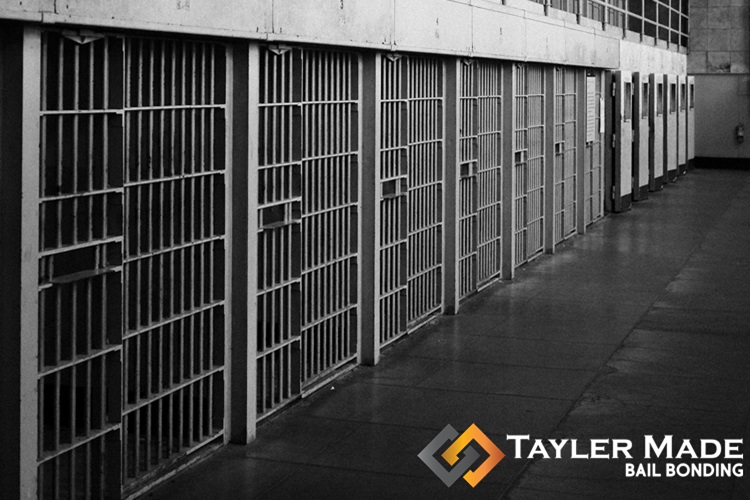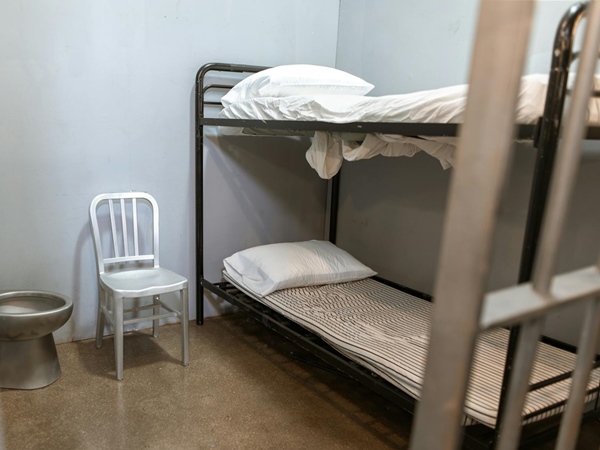Arriving in Jail or Prison: What New Inmates Can Expect
News and Resources
Whether you or a loved one is facing incarceration, this guide provides clarity and essential information to navigate these challenging experiences. In this article, the Tayler Made Bail Bonding team outlines what individuals can expect after arriving in jail versus prison, highlighting the distinct processes and environments of each. We'll cover the initial intake procedures, daily routines, and the role of bail bonding agents in the justice system. Read on to learn more about what happens in the early days of confinement in a jail or prison.
What Happens When You Arrive at Jail
Arriving at jail can be a daunting experience, especially for those new to the criminal justice system. Unlike prison, which is intended for long-term confinement following a conviction, jails primarily hold individuals awaiting trial or sentencing or serving short sentences. The process and environment in jail can be markedly different from those in prison. Here's a detailed look at what happens when someone arrives at jail.
Terms to Know
- Booking • The procedure of recording details about a criminal suspect in the police station or jail system following their arrest.
- Contraband • Items that are prohibited by law (including drugs and weapons) or banned for inmates within a specific facility (such as cell phones).
- Protective custody • The separation of specific prisoners from the general inmate population to ensure their safety. This segregation can be initiated by either the inmates themselves or the staff for various reasons, typically related to inmate safety.
Initial Intake and Booking
When an individual is arrested, they are first transported to a local jail for booking. The booking process includes several steps:
- Identification and Documentation: The arrested person's personal information, such as name, date of birth, and address, is recorded. This information is used to create a booking record.
- Fingerprinting and Photographing: The individual's fingerprints are taken and entered into a national database. A mugshot is also taken to document the person's appearance at the time of arrest.
- Property Inventory: The arrested person's personal belongings are collected, inventoried, and stored. Items that are considered contraband are confiscated. Non-contraband items are typically returned upon release.
Medical Screening
Upon arrival, a basic medical screening is conducted to assess the individual's health and identify any immediate medical needs. This screening helps ensure that any required medical treatment can be provided promptly and that contagious diseases are identified early.
Housing Assignment

Following the booking process, the individual is assigned to a housing unit. The assignment is based on various factors, including the severity of the charges, the individual's behavior, and the availability of space. Typically, most jail cells in Colorado are designed to house two inmates. However, this can vary depending on the specific facility and the current population levels. Jails have different units for various categories of inmates. Those with mental health issues may be placed in specialized units with access to mental health professionals and appropriate medical care.
High-risk offenders are usually assigned to more secure units with enhanced monitoring and stricter security protocols to prevent incidents and ensure the safety of staff and other inmates. In contrast, individuals needing protective custody, such as those who might be at risk from the general inmate population, are housed in separate units to ensure their safety. These protective custody units offer additional safeguards and reduced contact with other inmates to minimize potential threats.
Bail and Bond
One of the significant differences between jail and prison is the opportunity for bail. Bail is a set amount of money that acts as insurance between the court and the person in jail (the defendant). A bail bonding agent can be contacted to post bail on behalf of the defendant. Bail bonding agents play a crucial role in the justice system by helping individuals secure their release from jail while awaiting trial.
Daily Life in Jail
The daily routine in jail is structured but varies significantly from prison. In jail typically have less access to programs and activities than those in prison. The focus in jail is on short-term confinement; therefore, there are fewer opportunities for work assignments, educational programs, or recreational activities.
Court Appearances
Inmates in jail may have frequent court appearances as their cases progress through the legal system. They are transported from the jail to the courthouse under the supervision of law enforcement officers. These appearances can be stressful and disorienting, especially for those unfamiliar with the legal process.

SOURCE: Courthouses.CO
What Happens to Someone When They Are Sent to Prison
The last thing anyone wants to hear is a judge sentencing them to years in prison. It has a finality that is difficult for many people to deal with, even those resigned to doing the time for their crime. But while thousands of videos and TV programs detail what goes on in the nation's courtrooms, we never see what happens when a person sentenced to prison is led out of the courthouse. In this post, Denver County's most trusted 24-hour bail bonds company details what happens to someone sentenced to prison.
Arriving at the Prison
"After being led out of the courthouse, the prisoner is transported to the nearest prison to be processed. The law requires every prisoner to undergo a strip search upon arrival. An officer of the same sex will be assigned to perform the search, which checks to make sure the new inmate is not hiding anything."
—U.S. Department of Justice
Property Inspected and Stored
After a new inmate's initial processing and strip search, they'll proceed to another area where their belongings are handed over to the reception staff. The reception staff will examine the inmate's property and determine which items are and are not allowed in the facility. Any items not allowed inside the prison will be stored away and reclaimed upon the prisoner's eventual release.
Clothing Issued
All prisoners must wear the same prison-issued clothing that visually differentiates them from staff and others working in or visiting the facility. Some states allow certain prisoners to wear 'normal' clothing as a reward for good behavior, but that is a rare exception. However, inmates in federal minimum security prisons are often allowed to wear street clothes.
Prison Number Issued
After the prisoner is searched, their property confiscated, and clothing issued, they are assigned a unique prison number that will become part of their permanent record for the rest of their life. They will also be given a release date that signifies the earliest date of release (EDL). At this point, some prisons will require the new inmate to sit for a photograph and have their fingerprints taken.

Health Checkup
Next, the new prisoner is typically taken to see a health professional who will conduct a basic health checkup. They will ask whether the prisoner is addicted to alcohol or other drugs, whether they have any medical conditions that require medication, and whether they've ever been diagnosed with any psychiatric disorders. Once the health checkup is complete, the prisoner is led to their cell.
First Night in Prison
Prisoners may be allowed to buy some basic items like toiletries and sweets, depending on the prison. Some prisons also have special cells reserved for new arrivals. These are intended to ease the transition to prison life. But not all prisons have them. If the prison does not, the new arrival will be taken to the regular cell block with the rest of the population.
Settling in for the Long Haul
Ultimately, the new prisoner will be matched with someone the staff feels is compatible to avoid hostilities. These matches are rarely ideal, but the staff does what they can to put the inmates in their care. Prison is also one of the few places where smoking is still allowed, although it is typically only allowed in the cell, not the common areas of the prison.
Jail vs. Prison: Primary Differences
The distinctions between jail and prison are significant. Here are some key differences:
- Length of Stay: Jail is designed for short-term stays, typically for individuals awaiting trial or serving short sentences. Prison, on the other hand, is for long-term confinement following a conviction.
- Bail Opportunities: In jail, individuals often have the opportunity to post bail and secure their release while awaiting trial. This is not the case for those in prison who have already been sentenced.
- Environment and Conditions: Jails tend to be more crowded and have fewer amenities than prisons. The focus in jail is on security and short-term confinement, while prisons often provide more comprehensive programs and facilities for long-term rehabilitation.
- Interaction with Bail Bonding Agents: Bail bonding agents are frequently involved in the jail process, helping individuals navigate the complexities of posting bail. Their role is less prominent in the prison system, where the focus shifts to long-term incarceration and rehabilitation.
Jail vs. Prison Guide
Call Tayler Made for Denver Bail Bonding
Hopefully, you never have to spend time in prison. But remember, if you've been arrested, Tayler Made offers affordable bail bonds that will take you home in no time. We serve Denver County, Jefferson County and additional communities throughout the state of Colorado. Call our 24/7 bail agents at 303-623-0399 for assistance around-the-clock.
Contact Info
Tayler Made Bail Bonding is available 24 hours a day and 7 days a week.
(303) 623-0399email@taylermadebailbonding.com
3595 South Teller Street
Suite 300A
Lakewood, CO 80235
@TaylerMadeBail

